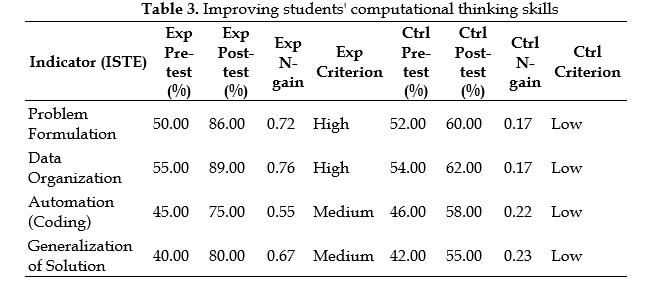Assessing the Efficacy of Coding with Scratch and AI Interaction Using ChatGPT on 5th Graders’ Math Performance and Computational Thinking
DOI:
https://doi.org/10.30736/reforma.v15i1.1212Keywords:
Computational Thinking, Artificial Intelligence, Coding, Primary EducationAbstract
This study explores the effectiveness of integrating coding using Scratch and AI interaction via ChatGPT to enhance the mathematics performance and computational thinking skills of 5th-grade students. An experimental group, which received training using these tools, showed significant improvements in mathematical problem formulation, data organization, and higher-order cognitive skills such as analysis, evaluation, and creation, as measured by Bloom's Taxonomy. These gains were notably higher compared to a control group using traditional methods. The results demonstrate that the use of Scratch for coding and ChatGPT for AI interaction not only enhances mathematical understanding but also fosters critical thinking, problem-solving, and collaborative learning. This integration supports the development of computational thinking, preparing students for future challenges in a technology-driven world. The study highlights the potential of digital tools in transforming primary education by promoting deeper engagement and fostering essential 21st-century skills.
Downloads
References
Abulibdeh, A., Zaidan, E., & Abulibdeh, R. (2024). Navigating the confluence of artificial intelligence and education for sustainable development in the era of industry 4.0: Challenges, opportunities, and ethical …. Journal of Cleaner Production. https://www.sciencedirect.com/science/article/pii/S0959652623046851
Adhikari, B., Dhakal, S., & Jha, A. (2024). Maximizing Student Engagement in Coding Education with Explanatory AI. 2024 IEEE Frontiers in Education …. https://ieeexplore.ieee.org/abstract/document/10893108/
Akhwani, A., & Rahayu, D. W. (2021). Analisis Komponen TPACK Guru SD sebagai Kerangka Kompetensi Guru Profesional di Abad 21. Jurnal Basicedu, 5(4), 1918–1925. https://doi.org/10.31004/basicedu.v5i4.1119
Allam, H., Dempere, J., Akre, V., Parakash, D., & ... (2023). Artificial intelligence in education: an argument of Chat-GPT use in education. 2023 9th …. https://ieeexplore.ieee.org/abstract/document/10184267/
Ashoumi, H., & Yusuf, M. A. (2024). Pendidikan Inklusi: Integrasi Konsep Konstruktivistik Vygotsky dan Landasan Al-Qur’an untuk Mendukung SDGs 4. Intelektual: Jurnal Pendidikan Dan …. https://ejournal.uit-lirboyo.ac.id/index.php/intelektual/article/view/6308
Azzahroh, S. N. F., Septaria, K., & Wulandari, S. A. (2024). Pengaruh Model Pembelajaran Inkuiri Bermuatan Nature Of Science (NOS) Terhadap Argumentasi Ilmiah Pada Topik Zat Aditif. Jurnal Penelitian Sains Dan Pendidikan ….
Azzouz Boudadi, N., & Gutiérrez-Colón, M. (2020). Effect of Gamification on students’ motivation and learning achievement in Second Language Acquisition within higher education: a literature review 2011-2019. The EuroCALL Review, 28(1), 40. https://doi.org/10.4995/eurocall.2020.12974
Badeo, J. M. O., & Koc, B. C. U. O. K. (2021). Use of Comic-based Learning Module in Physics in Enhancing Students’ Achievement and Motivation. Science Education International, 32(2), 131–136. https://doi.org/10.33828/sei.v32.i2.6
Baidoo-Anu, D., & Ansah, L. O. (2023). Education in the era of generative artificial intelligence (AI): Understanding the potential benefits of ChatGPT in promoting teaching and learning. Journal of AI. https://doi.org/10.61969/jai.1337500
Bakker, A., Cai, J., & Zenger, L. (2021). Future themes of mathematics education research: An international survey before and during the pandemic. Educational Studies in Mathematics. https://doi.org/10.1007/s10649-021-10049-w
Bewersdorff, A., Zhai, X., Roberts, J., & Nerdel, C. (2023). Myths, mis-and preconceptions of artificial intelligence: A review of the literature. … Education: Artificial Intelligence. https://www.sciencedirect.com/science/article/pii/S2666920X2300022X
Broza, O., Biberman-Shalev, L., & Chamo, N. (2023). “Start from scratch”: Integrating computational thinking skills in teacher education program. Thinking Skills and Creativity. https://www.sciencedirect.com/science/article/pii/S187118712300055X
Cardona, M. A., Rodríguez, R. J., & Ishmael, K. (2023). Artificial intelligence and the future of teaching and learning: Insights and recommendations. policycommons.net. https://policycommons.net/artifacts/3854312/ai-report/4660267/

Downloads
Published
How to Cite
Issue
Section
License
Copyright (c) 2025 Firdaus Suryo Febriantoro, Lenny Kurniati

This work is licensed under a Creative Commons Attribution-ShareAlike 4.0 International License.
Penulis yang mempublikasikan naskahnya pada Jurnal ini menyetujui ketentuan berikut:
- Hak cipta pada setiap artikel adalah milik penulis, dan penulis mengakui bahwa Reforma : Jurnal Pendidikan dan Pembelajaran berhak sebagai pihak yang mempublikasikan pertama kali dengan lisensi Attribution-ShareAlike 4.0 International (CC BY-SA 4.0).
- Lisensi ini mengizinkan setiap orang untuk:
- Berbagi — menyalin dan menyebarluaskan kembali materi ini dalam bentuk atau format apapun;
- Adaptasi — menggubah, mengubah, dan membuat turunan dari materi ini untuk kepentingan apapun, termasuk kepentingan komersial.
Berdasarkan ketentuan berikut:
- Atribusi —Mereka harus mencantumkan nama yang sesuai, mencantumkan tautan terhadap lisensi, dan menyatakan bahwa telah ada perubahan yang dilakukan. Mereka dapat melakukan hal ini dengan cara yang sesuai, namun tidak mengisyaratkan bahwa pemberi lisensi mendukung Mereka atau penggunaan Mereka.
- BerbagiSerupa — Apabila Mereka menggubah, mengubah, atau membuat turunan dari materi ini, Mereka harus menyebarluaskan kontribusi Mereka di bawah lisensi yang sama dengan materi asli.
- Tidak ada pembatasan tambahan — Mereka tidak dapat menggunakan ketentuan hukum atau sarana kontrol teknologi yang secara hukum membatasi orang lain untuk melakukan hal-hal yang diizinkan lisensi ini.
- Penulis dapat memasukan tulisan secara terpisah, mengatur distribusi non-ekskulif  dari naskah yang telah terbit di jurnal ini kedalam versi yang lain (misal: dikirim ke respository institusi penulis, publikasi kedalam buku, dll), dengan mengakui bahwa naskah telah terbit pertama kali pada Reforma : Jurnal Pendidikan dan Pembelajaran







